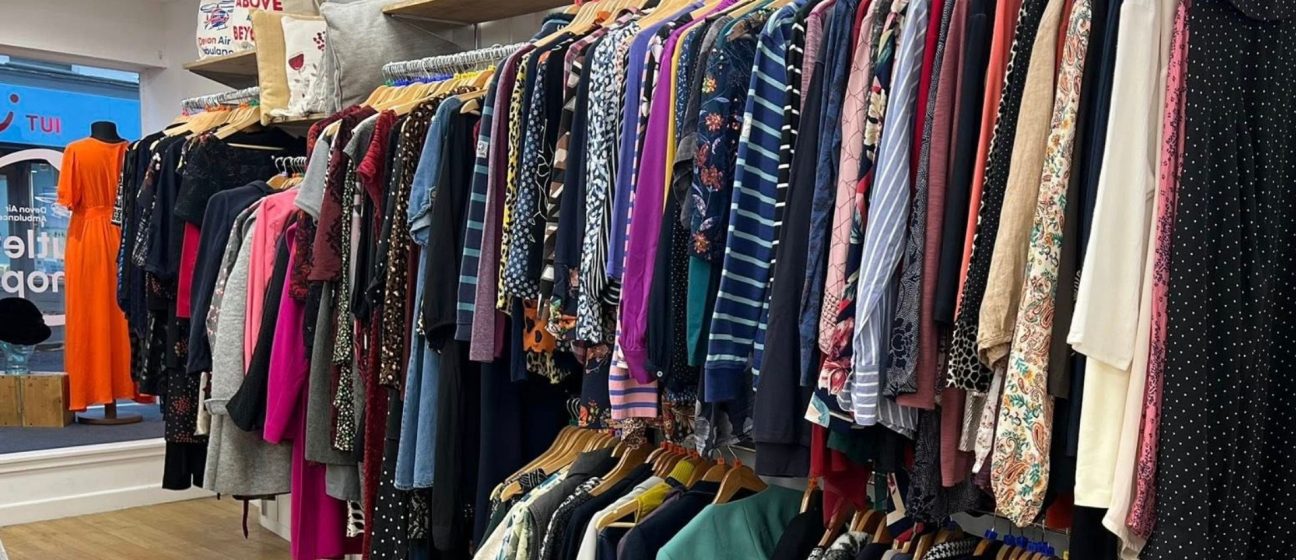
Your donations to our shops make a difference. Here’s how to make every gift matter.
How to help charity shops to make the most out of donations and take the strain off managing the onward journey of unsold items.
Despite billions of new garments being churned out by fashion brands every year and production showing no signs of slowing down, charity shops are often seen to be the end of the line in the UK for garments that the wearer is ready to pass on.
But here the picture becomes more complicated. Though charity shops like those of Devon Air Ambulance make an important and lifesaving income through the resale of donated garments, shoes and accessories, there is much that is donated that cannot be sold to high-street or online customers, for example, branded workwear or soiled clothes, or garments that are too worn even to be moved across to and repaired through DAA’s own Mishap Fashion sustainability label, which has otherwise generated significant income for the service since its launch.
As with all charity shops, the sheer volume of garments that cross the thresholds of our county-wide shops every day is such that each garment also inevitably reaches a ‘shelf life’ before it too must be moved on. Linda Cain, Retail Operations Manager at Devon Air Ambulance, says:
We value every donation made by those who choose to support us, and though we give every donation we receive the maximum opportunity to be sold to raise funds for the charity, there comes a time when inevitably it must move on, whether that’s to our bargain basement in our online shop, shopdaat.org, or to our outlet stores in Exmouth and Tiverton for a further reduction in price. If that garment still remains unsold after the maximum shelf time, it will be moved onwards to a rag merchant.
‘We have to make way for the new donations we receive as every square foot of selling space must be optimised to bring in as much income as possible in support of our frontline service.’
Unsold garments can bring some further income to charities through bulk reselling to a merchant collector, but with the overseas textile market already saturated by the mass production of fast-fashion and clothing sold on from high-income countries (across the world we produce 92 million tons of textile waste every year*) the income from the onward sale of textiles has been dropping since 2015†. This income stabilised lower still following the pandemic, which significantly interrupted the entire onward sales process.
Pressures such as movement being thwarted by geopolitical conflict and global transportation difficulties, labour challenges, such as lack of drivers associated with Brexit, overseas sorting, and a general drop in the overall quality of garments due to profit maximising by the fast-fashion industry, have seen rag merchants coming under greater pressure to survive.
‘We are keen to avoid a situation where we risk unsold garments building up in shops and in our warehouse,’ says Linda.
‘While we are keen to continue receiving quality garments that can bring an essential income to the charity from donors, we are nevertheless facing the continued challenge of being left with clothes that are not saleable to our customers.
‘We also ask that those kindly donating clothes to our stores drop them off while the shops are open. Clothing left outside closed shops risks contamination by the elements, or by people rummaging through piles which then can’t be sold, but we still have to manage their disposal, which then incurs a cost.’
So, what can those saddled with garments not fit for resale do with their unwanted textiles? Some shoppers are mailing unsaleable garments to the shops that they bought them from in a bid to encourage brands to make textiles that are more sustainable and therefore fit for onward use.
‘Better quality, more sustainable textiles make sense for everyone, and those, like us, serving the secondhand market can feel confident that more items donated to us will see renewed life as a preloved purchase,’ says Linda.
We’re grateful to everyone who donates garments, shoes, accessories and more to our charity shops, and everyone who shops with us. That support makes an enormous difference to the income we make that helps our crew to keep responding to time-critical missions in Devon every day.
Find your nearest Devon Air Ambulance charity shop.



